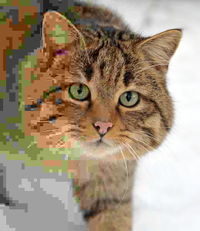
Photo from wikipedia
Most multimedia source encoders produce scalable bit streams that are vulnerable to noisy channel effects. Unequal error protection (UEP) designs are attractive solutions for such scalable bit streams. In the… Click to show full abstract
Most multimedia source encoders produce scalable bit streams that are vulnerable to noisy channel effects. Unequal error protection (UEP) designs are attractive solutions for such scalable bit streams. In the other hand, the structure of multiple concatenated codes, which consist of the combination of two or more elementary encoders and interleavers, offers a flexible implementation of unequal data protection. To provide an efficient protection for embedded source bit streams, an adaptive concatenated coding/decoding design is proposed in this paper inspired by serially concatenated turbo codes. This scheme involves iterative decoding of concatenated codes for JPEG 2000 image transmission. In the case of time varying channels, the concatenated coding rates are adaptively chosen to maximize the visual quality. The simulation results show that the proposed scheme achieves better image quality improvements at the receiver side compared with a conventional multiple turbo codes-based design, with significant peak-signal-to-noise ratio gains.
Journal Title: IEEE Access
Year Published: 2019
Link to full text (if available)
Share on Social Media: Sign Up to like & get
recommendations!